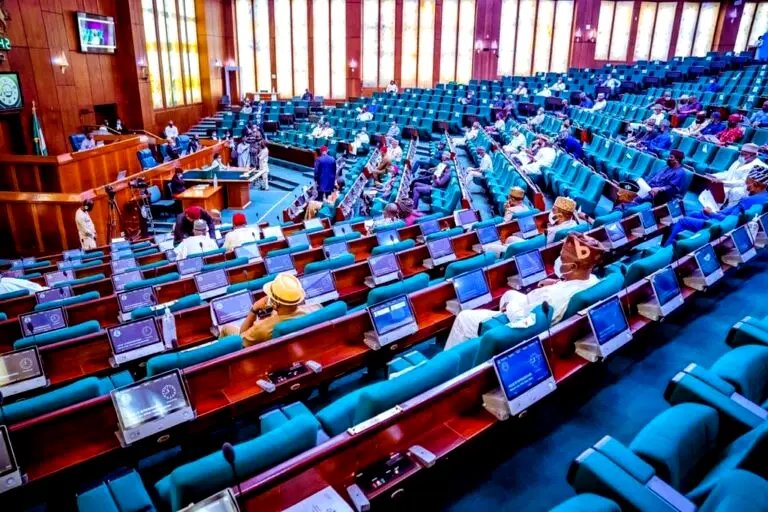The House of Representatives has passed for second reading, a bill seeking to prevent the trial of Justices and judges before the Code of Conduct Tribunal.
The legislation is from the harmonisation of proposals from seven members, namely Nkeiruka Onyejeocha, Solomon Bob, Obinna Chidoka, Nicholas Ossai, Olajide Olatubosun, Ben Igbakpa and Olawale Raji. It was titled ‘A Bill for an Act to Amend the Code of Conduct Bureau and Tribunal Act, Cap. C15, Laws of the Federation of Nigeria, 2004.’
One of the bills, which was sponsored by Bob, was titled ‘A Bill for An Act to Amend the Code of Conduct Bureau and Tribunal Act to Insulate Judicial Officers from Prosecution Before Being Lawfully Removed from Office.’
The CCT had in April 2019, in a record judgment, convicted Justice Walter Onnoghen of charges of breach of the Code of Conduct for Public Officers and ordered his removal from office as the Chief Justice of Nigeria.
The three-man tribunal led by Danladi Umar had also ordered Onnoghen’s removal as the Chairman of both the National Judicial Council and the Federal Judicial Service Commission.
The Tribunal had also banned the ex-CJN from holding any public office for a period of 10 years.
It also ordered the forfeiture of the funds in the five bank accounts which the defendant was said to have failed to declare as part of his assets in breach of the Code of Conduct for Public Officers.
Onnoghen had appealed the judgment.
In the lead debate during the second reading of the bill at the plenary on Tuesday, Bob noted that the bill seeks to amend Sections 20 and 24 of the Act, while the amendment is “intended to protect judicial officers from arbitrary prosecution and removal from office.”
The lawmaker explained that Section 20 of the Act, which creates the Code of Conduct Tribunal, is proposed to be amended by adding the words, ‘which shall be superior court of record with exclusive jurisdiction to try offences under this Act.’
He also said Section 24 is to be amended by adding two subsections numbered Subsection 5 and 6 to the existing subsections. “The additional subsections sought to be added by this amendment reads thus: (5) Nothing in this Act shall permit the commencement of any action against a judicial officer before the Tribunal unless such judicial officer has been validly removed from office under Section 292(1) of the Constitution. (6) Any action seeking to prosecute any judicial officer in contravention of Subsection (5) of this section shall not be entertained by the Tribunal.”
Bob said, “It is axiomatic that in a presidential democracy such as we profess to practice, the three arms of government are distinct and independent of one another, each with its powers constitutionally determined. Under our Constitution, their powers are created by Sections 4, 5 and 6 for the Legislature, Executive and Judiciary, respectively. It is the intention of the Constitution that each arm of the government be empowered to discharge its responsibilities without interference by the other arms. This is in sync with the U.S. presidential democracy after which we patterned our version.
“The Code of Conduct Tribunal, which is the crux of this bill, is a body with statutory judicial powers to try and sanction public office holders found to be in breach of the Code of Conduct Bureau Act. The powers of the Tribunal are pursuant to Section 24 of the Principal Act – The Code of Conduct Bureau and Tribunal Act.
“Let it suffice to state here that the Constitution has made very clear provisions for removal of elected officials including judicial officers. The obvious intention is to obviate the threat of arbitrary removal from office, thereby safeguarding the sanctity of the office and affording the office holders a leeway to discharge the functions of their office without fear or favour in line with their oath of office.”
The lawmaker pointed out that for judicial officers, the procedure or process for their removal from office is as enunciated in Section 292 of the 1999 Constitution. He said Section 292(1) makes it imperative for the removal of the head of a court by the President or the Governor, as the case may be, to act only on an address by the relevant Legislative House; and in any other case, i.e. judicial officers other than heads of courts by the President or Governor, as the case may be, acting on the recommendation of the National Judicial Council.
“It is pertinent to note that in both cases, the basis of such removal is incapacity – whether arising from infirmity of mind or body, misconduct or contravention of the code of conduct,” he stated.
The lawmaker pointed out that the essence of good legislation is the ability of the legislation (statute) to regulate and ensure orderly conduct in the affairs of men or state, promote transparency in the running of government and eliminate “or at least minimise mischief” in public discourse.
He stated, “It is against this backdrop that this proposed legislation (amendment) aims at securing the sanctity of the office of judicial officers, their tenure, freedom from arbitrary interference and harassment, and to ensure that no judicial officer is put on trial except upon being lawfully removed in strict fidelity to Section 292 of the Constitution.
“Giving effect to this amendment (bill) will, besides securing the tenure or office of the judicial officers, negate the apparent absurdity and illogicality of a man who is himself under trial for wrongdoing, sitting in judgment over another for contravening the law.
“This is a piece of legislation that has high propensity to entrench the rule of law and concomitantly deepen our democracy. I, therefore, with utmost sense of responsibility, urge you my colleagues to pass it into law.”

